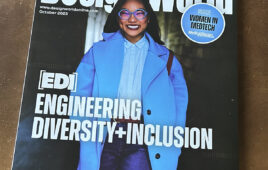Ingrid Tay, Technical Training Manager, Microchip Technology
Bachelor of Science in Engineering, Arizona State University; Master of Business Administration, Grand Canyon University
Ingrid Tay is a Technical Training Manager based at Microchip’s global headquarters in Chandler, Arizona. In this role, Ms. Tay oversees the Technical Training Writing Services team, which supports the company’s engineering and sales functions. She joined Microchip in 2013 after graduating with a Bachelor of Science (BS) degree in engineering from Arizona State University. In 2020, she earned a Master of Business Administration (MBA) from Grand Canyon University. Ms. Tay also is active in introducing students of all ages to robotics and engineering, working to support and staff programs including the FIRST Robotics Competition international program for high school students. She is a co-founder of the Building Dreams Robotics organization, which promotes Science, Technology, Engineering and Math (STEM) among students in underserved communities.

Talk about the culture at your company. What makes it inclusive or supportive of women in engineering and automation?
I really believe Microchip’s culture is one-of-a-kind. Microchip is a company whose people really embrace and live by our guiding values. All of my managers have been very supportive of the advocacy for Science, Technology, Engineering and Math (STEM) that I do outside of work. Microchip has given me the opportunity to volunteer at FIRST Robotics Competition and VEX Robotics events, which help to encourage the next generation of engineers and scientists. Many Microchip female employees like myself have participated as judges and mentors at multiple robotics and science fair events. Moreover, Microchip shows its support for engineering by sponsoring multiple robotics teams in Arizona. In addition, I’ve had the opportunity to represent my company as a Women in Computer Science and Engineering panelist at the Arizona Science Tech Festival where we provided advice to women working as engineers and young women engineering students. Also, I often speak to minority students at engineering summer programs about my college experience being an engineering student and now a working professional. I encourage them to continue in engineering and talk about how companies such as Microchip support women in engineering fields, and how our jobs are very rewarding.
Describe a recent company project (in which you were involved) that went particularly well. How did you and your team go about ensuring success?
We recently moved all our customer-facing training content to a brand-new web platform, to improve the user experience and our content management capability. The project involved developers, technical writers, engineers, and our content management system team. Looking back, with this large project successfully behind us, what made it such a positive outcome for the company was our strategy execution. At the beginning of the project, the managers from all the teams came together to develop a strategy (game plan). Everyone explained what they wanted the end state to look like and determined the many steps to take to achieve our collaborative goal. We then went back to our individual teams and identified their roles and responsibilities and provided clear direction. As we were executing the strategy, we constantly asked for team feedback. No question or comment was too small to consider and discuss! We needed to know what was working and what we needed to improve. It was very important to take all the input into consideration and also to keep the team well informed as decisions were being made. We held weekly meetings to update each other on our progress so open communication played a key role in the success. Managers made themselves available to answer questions as they arose, and this kept blockers and potential bottlenecks to a minimum while addressing concerns. In the end, this was a terrific cross-functional project that brought people together to collaborate and complete a very critical project for the corporation in a timely way.
What first drew you to engineering and this industry?
Robotics played a key role in my early development and curiosity, and a path to my professional pursuits. In high school, when teachers noticed my inclination toward math and science, they suggested I apply my skills as a member of the robotics team, which had been recognized internationally. As soon as I began participating in the design and construction of robots, I fell in love with engineering. Being part of the school’s Falcon Robotics Team 842 really introduced me to the broader engineering discipline. Taking it a step further, I developed an all-girls robotics sub-team that participated in the FIRST Robotics Competition in San Diego. It was a very valuable lesson for the team and for me because we were able to experience all aspects of the competition and had the opportunity to solve every problem we encountered – whether mechanical or electrical. Robotics also provided me the opportunity to develop leadership skills. I presented to a panel of judges about the efforts the team was making to bring Science, Technology, Engineering and Math (STEM) awareness across the State of Arizona. In 2008, the team won the most prestigious award in the International FIRST Robotics Competition. FIRST‘s ultimate goal is to transform cultures and inspire greater levels of respect and honor for science and technology, as well as encourage young people to become science and technology leaders. These early experiences ultimately were my inspiration to pursue, learn, grow and succeed in an engineering career.
Describe your biggest career challenge. How did you solve it – or what was the outcome or lesson learned?
One of the major challenges in my career so far has been learning to let go, whether that may mean getting others involved on a project or delegating. Additionally, the transition from individual contributor to manager was also a growth challenge. I believe many engineers always want to take charge and participate in all aspects of a project. As projects get bigger and more complex, however, it becomes harder to handle everything. I learned that it’s best for people with specialized skills to complete the tasks pertaining to their area of expertise. It’s impossible to know everything about a subject. Letting others help you and support your projects actually ensures that the projects have the best possible outcome. Building a team from the ground up has also proven to be challenging. Getting to know your team, their strengths, and weaknesses and helping them to collaborate and achieve the end result has been very rewarding. Being a manager has taught me to understand the bigger picture, see how my team fits into that departmental and business line vision, and also choose how to best utilize our resources. It has shifted my focus from very specific details about a project to how I can best help my team overcome barriers and ultimately succeed in their roles.
What career advice would you give to your younger self?
I would tell my younger self to engage in hands-on learning opportunities sooner, and as often as possible. Knowing the theoretical part of engineering is important but applying what you learn is very fun! And, figure out what you like doing and do what it takes to become very good at that. I would also encourage myself to not be afraid to ask for help when needed and to ask questions. Ignore the fear of embarrassment. Embrace mistakes as learning opportunities to grow from. Doing the work (and sometimes making mistakes) is how you start gaining experience and really growing. Also, be willing to change your ways and what you know so you can learn from others. I would also tell myself to not be shy – start talking to people you look up to. Ask about what they’ve done to get where they are so you can get an idea of what it takes to earn those positions you seek. Then, never stop learning. Things are always changing and there is always something new you’ll want to understand so you don’t get left behind. Help others whenever possible.
Filed Under: Engineering Diversity & Inclusion




